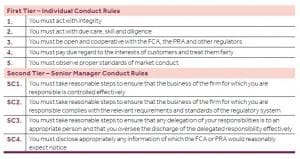Even with all the deferrals of deadlines around implementation of the SMCR as a result of COVID, firms should now be well into business as usual mode with all aspects of SMCR.
In particular, all staff covered by SMCR should have received communications and training around the Conduct Rules. Ideally, conditions of employment should also have been amended to documented so that it is clear to all that adherence to the Conduct Rules is a requirement.
SMCR was rolled out to Banks and Insurers earlier than to solo regulated firms and we know from the FCA’s follow up research into how well those firms were embedding SMCR in the organisation that the FCA looked closely at how well the Conduct Rules had been incorporated. It would be reasonable to imagine that a similar approach will be taken when the inevitable themed visits on solo regulated firms take place in the not too distant future.
The rules

The first tier rules apply to all relevant staff. Senior Managers are additionally subject to the second tier rules. The rules apply to a firm’s regulated and unregulated financial services activities (including any related ancillary activities carried on in connection with a regulated activity).
Notification of breaches
FSMA 64C requires firms to notify the FCA when disciplinary action has been taken against a person for a Conduct Rules breach. Notification of disciplinary action is only required if that action was because of Conduct Rule breaches.
The timing for Conduct Rule breaches is:
- For Senior Managers, notification is required within 7 business days of concluding disciplinary action
- For other individuals, the notification needs to be made every year.
Most firms will report in October, for the reporting year 1 September to 31 August, with a due date of 2 months later.
Limited Permission Consumer Credit firms will report in line with their reporting year, alongside their annual return.
Firms need to make an annual notification about Conduct Rules even if there haven’t been any breaches. to make sure firms correctly monitor and identify Conduct Rule breaches.
Disciplinary action means:
- issuing of a formal written warning
- suspension or dismissal of a person, or
- reduction or recovery of remuneration (clawback)
Further thoughts
The detailed rules around this topic are contained in SUP 15 and COCON and the FCA’s SMCR guide published in the run up to SMCR in 2019 remains a useful reference. We would add the following thoughts …
- Disciplinary action per se does not require notification – the outcome of many disciplinary proceedings in a well run firm is either ‘we have investigated the matter and there is no case to answer’ or ‘there is a case to answer – INFORMAL and/or VERBAL warning’
- Notification is only required if:
- The matter related to a breach of the applicable conduct rules AND
- It resulted in the issue of a formal written warning or suspension/dismissal or reduction/recovery
- Note that a firm would be at risk of breaching employment legislation if either suspension/dismissal or reduction/recovery occurred without the due process of a disciplinary investigation having been undertaken
- In the event that an individual appealed the outcome, firms must still report the action and the fact and outcome of the appeal
- A notification is still required notwithstanding any agreement, for example a ‘COT 3’ Agreement settled by the Advisory, Conciliation and Arbitration Service (ACAS) or any other arrangements entered into by the firm and an employee upon termination of that employment. Furthermore, firms should not enter into any such arrangements that could conflict with its notification obligations.
- Failure to notify can be a CRIMINAL OFFENCE!
Even if the ‘offending action’ is not related to a breach of the conduct rules, firms need to consider whether notification is still required on other grounds. The notification requirement in respect of breaches of the Conduct Rules doesn’t change or remove firms’ obligations to report concerns about an individual’s conduct under existing rules and principles, such as FCA Principle 11.







New Content Integration with Pacific Asset Management
Doug McFarlane Suitability 2025, Content Integration, content management, EU, FCA, Integration, Investment, ML, Pacific, Pacific Asset Management, PI, Update
We have some exciting news on the latest upgrade to ATEB Suitability on 9 April 2025. This update comes at no additional cost and provides a new addition to our content integration library. We have partnered with Pacific Asset Management to provide our customer firms with access to the following: A description of their service […]